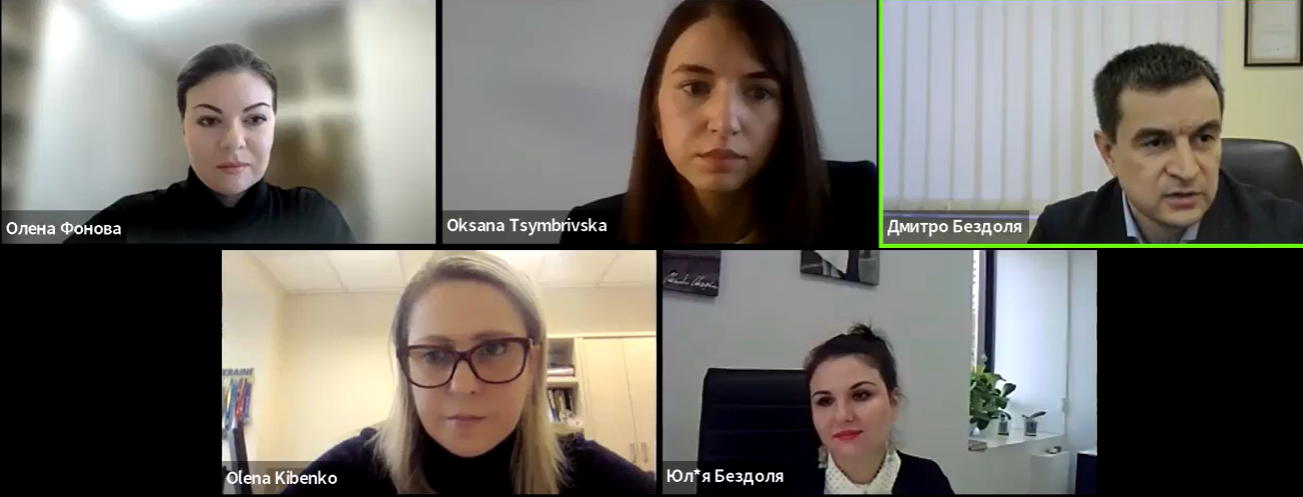How to Improve Economic Proceedings in War Period: the EU Project Pravo-Justice Co-organized the Thematic Webinar

On November 3, the EU Project Pravo-Justice together with the Supreme Court held an online webinar, initiated by the Association for Development of Judicial Self-Government in Ukraine and dedicated to the “Topical Issues of Economic Justice under Martial Law in Ukraine.” The discussion brought together judges of economic courts; justices of the Cassation Economic Court of the Supreme Court; representatives of the Donbas Regional Justice Reform Council; lawyers; BTs; PEO; and experts of the EU Project Pravo-Justice.
“Following the eight-month full-scale invasion by the Russian Federation, we now understand and can clearly identify the problems that arise in economic litigation process, while looking for high-quality solutions. The EU Project Pravo-Justice will support in every possible way both the judiciary and legislators in their efforts to solve the existing problems relating to judicial proceedings with a focus on optimizing the judicial process, including its digitization,” said Oksana Tsymbrivska, Country Manager of the EU Project Pravo-Justice, in her welcoming remarks.
Dmytro Bezdolia, Chairman of the Board of the Association for Development of Judicial Self-Government in Ukraine, in his welcoming speech, stressed upon the need to strengthen the judiciary, as it “is a pre-requisite for Ukraine’s future accession to the EU.” He also underlined that in the context of Russia’s full-scale armed aggression against Ukraine, business entities need quick and comprehensive legal protection more than ever before.
The speakers covered four main thematic blocks at the webinar. The first concerned the peculiarities of economic legal relations in the context of full-scale armed aggression by the Russian Federation. Olena Kibenko, justice of the Cassation Economic Court of the Supreme Court, Doctor of Law, who spoke within the first block, covered the topic of corporate disputes in war time and shared with the participants the latest practice of the Supreme Court in respective high-profile cases.
Yuliia Bezdolia, judge of the Economic Court of Odesa region, reported on how the war affected the consideration of real estate disputes and debt collection in court.
The second block was dedicated to the discussion of the economic procedure after February 24, 2022. Vitalii Urkevych, justice of the Cassation Economic Court of the Supreme Court, highlighted in his speech the peculiarities of how the court assessed the validity of reasons for violating procedural deadlines under martial law.
Liudmyla Volkova, lawyer, adviser at AVELLUM Law Firm, Doctor of Law, co-coordinator of the Donbas Regional Justice Reform Council, spoke about the problems faced by the forensic experts at time of war. Olena Fonova, judge of the Economic Court of Luhansk region, PhD in Law, coordinator of the Donbas Regional Justice Reform Council, gave a presentation on the need for remote trial of cases and proper consideration of existing challenges relating to martial law, alongside best practices of European jurisdictions.
The third block, which dealt with bankruptcy under martial law, was dedicated to the discussion of two issues. Oleksandr Bondarchuk, Chairman of the Ukraine National Insolvency Trustees Association, lawyer, Doctor of Economics, spoke about the new challenges for financial rehabilitation as a mechanism for restoring the debtor’s solvency. Olena Volianska, Partner, Head of Bankruptcy and Restructuring Practice at LCF Law Group, BT and defense lawyer, reported on the problematic issues of implementing the sanction-related policy and legislation on nationalization in bankruptcy cases.
Enforcement of judgments in the context of full-scale war was covered within the fourth block of the webinar. Vitalii Chepurnyi, Chairman of the Association of PEOs of Ukraine, explained why enforcement of court decisions is delayed during martial law and how it is necessary to harmonize the existing legislation in order to give impetus to enforcement. In his report, Andrii Avtorgov, PEO of Kyiv executive district, member of the Disciplinary Commission of PEOs, Chairman of the Subcommittee on Enforcement Proceedings, PhD in Law, outlined the problematic issues of assessing the debtor’s real estate within the enforcement proceedings.